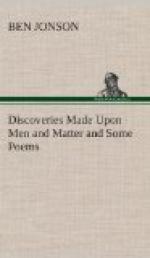Hercules.—Theseus.—Achilles.—Ulysses.—Homer and Virgil.— AEneas.—Venus.—So many there be of old that have thought the action of one man to be one, as of Hercules, Theseus, Achilles, Ulysses, and other heroes; which is both foolish and false, since by one and the same person many things may be severally done which cannot fitly be referred or joined to the same end: which not only the excellent tragic poets, but the best masters of the epic, Homer and Virgil, saw. For though the argument of an epic poem be far more diffused and poured out than that of tragedy, yet Virgil, writing of AEneas, hath pretermitted many things. He neither tells how he was born, how brought up, how he fought with Achilles, how he was snatched out of the battle by Venus; but that one thing, how he came into Italy, he prosecutes in twelve books. The rest of his journey, his error by sea, the sack of Troy, are put not as the argument of the work, but episodes of the argument. So Homer laid by many things of Ulysses, and handled no more than he saw tended to one and the same end.
Theseus.—Hercules.—Juvenal.—&
shy;Codrus.—Sophocles.—Ajax.—Ulysses.-
-Contrary to which, and foolishly, those poets did,
whom the philosopher taxeth, of whom one gathered
all the actions of Theseus, another put all the labours
of Hercules in one work. So did he whom Juvenal
mentions in the beginning, “hoarse Codrus,”
that recited a volume compiled, which he called his
Theseide, not yet finished, to the great trouble both
of his hearers and himself; amongst which there were
many parts had no coherence nor kindred one with another,
so far they were from being one action, one fable.
For as a house, consisting of divers materials, becomes
one structure and one dwelling, so an action, composed
of divers parts, may become one fable, epic or dramatic.
For example, in a tragedy, look upon Sophocles, his
Ajax: Ajax, deprived of Achilles’ armour,
which he hoped from the suffrage of the Greeks, disdains;
and, growing impatient of the injury, rageth, and
runs mad. In that humour he doth many senseless
things, and at last falls upon the Grecian flock and
kills a great ram for Ulysses: returning to his
senses, he grows ashamed of the scorn, and kills himself;
and is by the chiefs of the Greeks forbidden burial.
These things agree and hang together, not as they
were done, but as seeming to be done, which made the
action whole, entire, and absolute.
The conclusion concerning the whole, and the parts.—Which are episodes.—Ajax and Hector.—Homer.—For the whole, as it consisteth of parts, so without all the parts it is not the whole; and to make it absolute is required not only the parts, but such parts as are true. For a part of the whole was true; which, if you take away, you either change the whole or it is not the whole. For if it be such a part, as, being present or absent, nothing concerns the whole, it cannot be called a part of the whole; and such are the episodes, of which hereafter. For the present here is one example: the single combat of Ajax with Hector, as it is at large described in Homer, nothing belongs to this Ajax of Sophocles.




